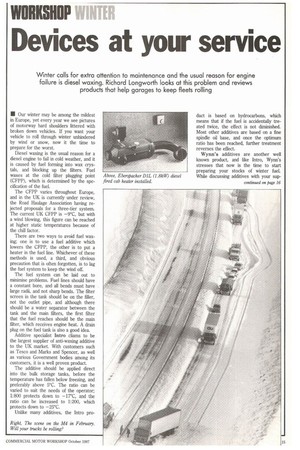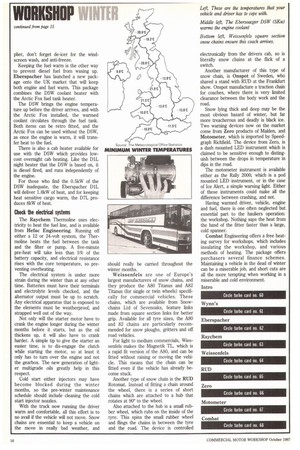Devices at your service
Page 109

Page 110

If you've noticed an error in this article please click here to report it so we can fix it.
Winter calls for extra attention to maintenance and the usual reason for engine failure is diesel waxing. Richard Longworth looks at this problem and reviews products that help garages to keep fleets rolling
• Our winter may be among the mildest in Europe, yet every year we see pictures of motorway hard shoulders littered with broken down vehicles. If you want your vehicle to roll through winter unhindered by wind or snow, now it the time to prepare for the worst.
Diesel waxing is the usual reason for a diesel engine to fail in cold weather, and it is caused by fuel forming into wax crystals, and blocking up the filters. Fuel waxes at the cold filter plugging point (CFPP), which is determined by the specification of the fuel.
The CFPP varies throughout Europe, and in the UK is currently under review, the Road Haulage Association having rejected proposals for a three-tier system. The current UK CFPP is —9°C, but with a wind blowing, this figure can be reached at higher static temperatures because of the chill factor.
There are two ways to avoid fuel waxing; one is to use a fuel additive which lowers the CFPP, the other is to put a heater in the fuel line. Whichever of these methods is used, a third, and obvious precaution that is often forgotten, is to lag the fuel system to keep the wind off.
The fuel system can be laid out to minimise problems. Fuel lines should have a constant bore, and all bends must have large radii, and not sharp bends. The filter screen in the tank should be on the filler, not the outlet pipe, and although there should be a water separator between the tank and the main filters, the first filter that the fuel reaches should be the main filter, which receives engine heat. A drain plug on the fuel tank is also a good idea.
Additive specialist Intro cliams to be the largest supplier of anti-waxing additive to the UK market. With customers such as Tesco and Marks and Spencer, as well as various Government bodies among its customers, it is a well proven product.
The additive should be applied direct into the bulk storage tanks, before the temperature has fallen below freezing, and preferably above 5°C. The ratio can be varied to suit the needs of the operator; 1:800 protects down to —17°C, and the ratio can be increased to 1:200, which protects down to —25°C.
Unlike many additives, the Intro pro duct is based on hydrocarbons, which means that if the fuel is accidentally treated twice, the effect is not diminished. Most other additives are based on a fine spindle oil base, and once the optimum ratio has been reached, further treatment reverses the effect.
Wynn's additives are another well known product, and like Intro, Wynn's stresses that now is the time to start preparing your stocks of winter fuel. While discussing additives with your sup
plier, don't forget de-icer for the windscreen wash, and anti-freeze.
Keeping the fuel warm is the other way to prevent diesel fuel from waxing up. Eberspacher has launched a new package onto the UK market that will keep both engine and fuel warm. This package combines the D5W coolant heater with the Arctic Fox fuel tank heater.
The D5W brings the engine temperature up before the driver arrives, and with the Arctic Fox installed, the warmed coolant circulates through the fuel tank Both items can be retro fitted, and the Arctic Fox can be used without the D5W, as once the engine is warm, it will transfer heat to the fuel.
There is also a cab heater available for use with the D5W which provides low cost overnight cab heating. Like the DlL night heater that the D5W is based on, it is diesel fired, and runs independently of the engine.
For those who find the 0.5kW of the D5W inadequate, the Eberspacher DIL will deliver 1.8kW of heat, and for keeping heat sensitive cargo warm, the D7L produces 8kW of heat.
Check the electrical systems
The Raychem Thermoline uses electricity to heat the fuel line, and is available from Hefac Engineering. Running off either a 12 or 24-volt system, the Thermoline heats the fuel between the tank and the filter or pump. A five-minute pre-heat will take less than 5% of the battery capacity, and electrical resistance rises with the core temperature, so preventing overheating.
The electrical system is under more strain during the winter than at any other time. Batteries must have their terminals and electrolyte levels checked, and the alternator output must be up to scratch. Any electrical apparatus that is exposed to the elements must be weatherproof, and strapped well out of the way.
Not only will the starter motor have to crank the engine longer during the winter months before it starts, but as the oil thickens up, it will also have to crank harder. A simple tip to give the starter an easier time, is to dis-engage the clutch while starting the motor, so at least it only has to turn over the engine and not the gearbox. The new generation of lighter multigrade oils greatly help in this respect.
Cold start either injectors may have become blocked during the winter months, so the pre-winter maintenance schedule should include cleaning the cold start injector nozzles.
With the truck now running the driver warm and comfortable, all this effort is to no avail if the vehicle will not move. Snow chains are essential to keep a vehicle on the move in really bad weather, and should really be carried throughout the winter months.
Weissenfels are one of Europe's largest manufacturers of snow chains, and they produce the A80 Titanus and A82 Titanus (for single or twin wheels) specifically for commercial vehicles. These chains, which are available from Snowchains Ltd of Sevenoaks, feature links made from square section links for better grip. Available for all tyre sizes, the A80 and 82 chains are particularly recommended for snow ploughs, gritters and off road vehicles.
For light to medium commercials, Wiessenfels makes the Magnetik TL, which is a rapid fit version of the A80, and can be fitted without raising or moving the vehicle. This means that the chain can be fitted even if the vehicle has already become stuck.
Another type of snow chain is the RUD Rotomat. Instead of fitting a chain around the wheel, there is a series of short chains which are attached to a hub that rotates at 900 to the wheel.
Also attached to the hub is a small rubber wheel, which rubs on the inside of the tyre. This spins the small rubber wheel and flings the chains in between the tyre and the road. The device is controlled electronically from the drivers cab, so is literally snow chains at the flick of a switch.
Another manufacturer of this type of snow chain, is Onspot of Sweden, who shared a stand with RUD at the Frankfurt show. Onspot manufacture a traction chain for coaches, where there is very limited clearance between the body work and the road.
Snow lying thick and deep may be the most obvious hazard of winter, but far more treacherous and deadly is black ice.
Two warning devices now on the market come from Zero products of Maiden, and Motometer, which is imported by Speed graph Richfield. The device from Zero, is a dash mounted LED instrument which is claimed to be sensitive enough to distinguish between the drops in temperature in dips in the road.
The motometer instrument is available either as the Rally 2000, which is a pod mounted LED instrument, or in the case of Ice Alert, a simple warning light. Either of these instruments could make all the difference between crashing, and not.
Having warmed driver, vehicle, engine and fuel, there is one often neglected but essential part to the hauliers operation: the workshop. Nothing saps the heat from the hand of the fitter faster than a large, cold spanner.
Combat Engineering offers a free heating survey for workshops, which includes insulating the workshop, and various methods of heating. The package offers purchasers several finance schemes.
Maintaining a vehicle in the dead of winter can be a miserable job, and short cuts are all the more tempting when working in a miserable and cold environment.




































































































































